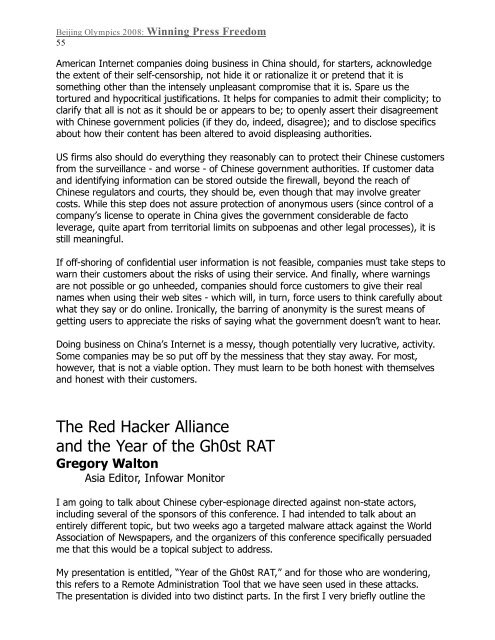Beijing Olympics 2008: Winning Press Freedom - World Press ...
Beijing Olympics 2008: Winning Press Freedom - World Press ...
Beijing Olympics 2008: Winning Press Freedom - World Press ...
You also want an ePaper? Increase the reach of your titles
YUMPU automatically turns print PDFs into web optimized ePapers that Google loves.
<strong>Beijing</strong> <strong>Olympics</strong> <strong>2008</strong>: <strong>Winning</strong> <strong>Press</strong> <strong>Freedom</strong><br />
55<br />
American Internet companies doing business in China should, for starters, acknowledge<br />
the extent of their self-censorship, not hide it or rationalize it or pretend that it is<br />
something other than the intensely unpleasant compromise that it is. Spare us the<br />
tortured and hypocritical justifications. It helps for companies to admit their complicity; to<br />
clarify that all is not as it should be or appears to be; to openly assert their disagreement<br />
with Chinese government policies (if they do, indeed, disagree); and to disclose specifics<br />
about how their content has been altered to avoid displeasing authorities.<br />
US firms also should do everything they reasonably can to protect their Chinese customers<br />
from the surveillance - and worse - of Chinese government authorities. If customer data<br />
and identifying information can be stored outside the firewall, beyond the reach of<br />
Chinese regulators and courts, they should be, even though that may involve greater<br />
costs. While this step does not assure protection of anonymous users (since control of a<br />
company’s license to operate in China gives the government considerable de facto<br />
leverage, quite apart from territorial limits on subpoenas and other legal processes), it is<br />
still meaningful.<br />
If off-shoring of confidential user information is not feasible, companies must take steps to<br />
warn their customers about the risks of using their service. And finally, where warnings<br />
are not possible or go unheeded, companies should force customers to give their real<br />
names when using their web sites - which will, in turn, force users to think carefully about<br />
what they say or do online. Ironically, the barring of anonymity is the surest means of<br />
getting users to appreciate the risks of saying what the government doesn’t want to hear.<br />
Doing business on China’s Internet is a messy, though potentially very lucrative, activity.<br />
Some companies may be so put off by the messiness that they stay away. For most,<br />
however, that is not a viable option. They must learn to be both honest with themselves<br />
and honest with their customers.<br />
The Red Hacker Alliance<br />
and the Year of the Gh0st RAT<br />
Gregory Walton<br />
Asia Editor, Infowar Monitor<br />
I am going to talk about Chinese cyber-espionage directed against non-state actors,<br />
including several of the sponsors of this conference. I had intended to talk about an<br />
entirely different topic, but two weeks ago a targeted malware attack against the <strong>World</strong><br />
Association of Newspapers, and the organizers of this conference specifically persuaded<br />
me that this would be a topical subject to address.<br />
My presentation is entitled, “Year of the Gh0st RAT,” and for those who are wondering,<br />
this refers to a Remote Administration Tool that we have seen used in these attacks.<br />
The presentation is divided into two distinct parts. In the first I very briefly outline the





